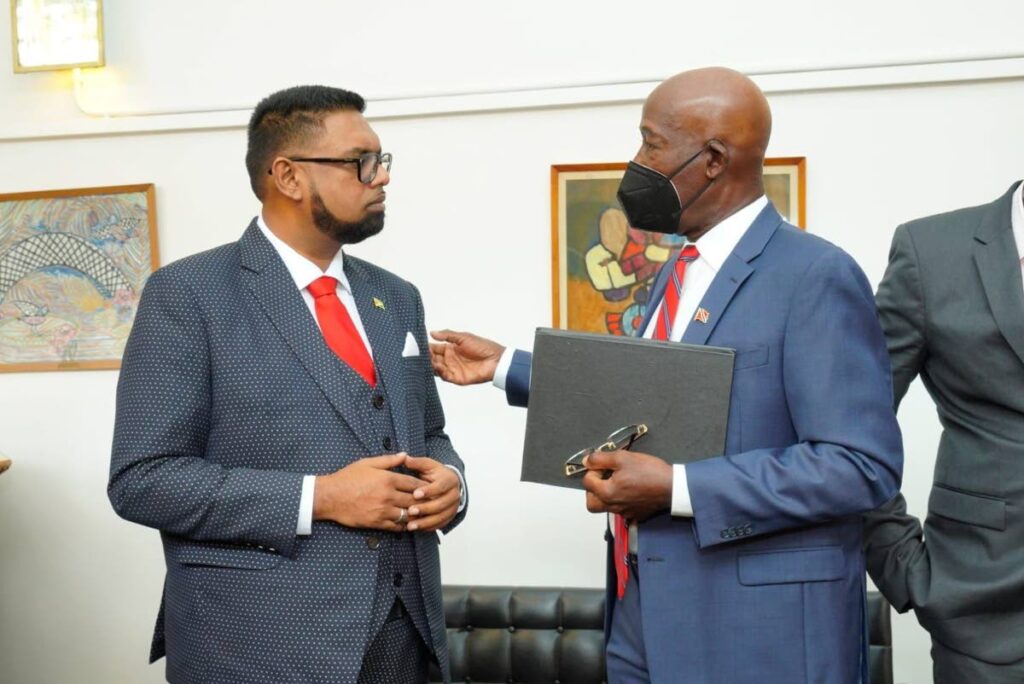Energy, agriculture high on Caricom agenda in Suriname

Caricom is optimistic about making headway on energy and food security issues when its leaders meet in Suriname on for their 43rd regular meeting from Sunday to Tuesday. TT is expected to play a pivotal role in both of these matters which feature prominently within the broader agenda for the three day meeting.
Addressing a news conference in Paramaribo on the upcoming meeting, Caricom-Secretary General Dr Carla Barnett said ongoing Russian military action in the Ukraine is having a negative impact on global energy supplies and contributing to fuel price increases in many countries.
Caricom has not been shielded from this. Within Caricom's quasi-cabinet, Barnett said, "The Prime Minister of Trinidad and Tobago is the lead on energy security." Dr Rowley left for Suriname on Saturday. Before his departure, he held a news conference at the Piarco International Airport which dealt with some matters relating to the Caricom leaders' meeting.
Barnett was confident that Caricom leaders would reach some consensus about how to address regional energy security issues.
Suriname president Chandrikapersad Santokhi agreed with Barnett. He observed that TT, Guyana and Suriname each have fossilised energy resources which include natural gas. Santokhi, the incoming Caricom chairman, said the leaders will discuss the possibility of a common strategy which could be used to speed up the exploitation of this gas for the benefit of the region.
Besides committing itself to assisting with energy supplies for the region, Santokhi said Suriname, Guyana and Belize are blessed with fertile lands which they are offering to be used to boost regional food supplies.
Noting one negative impact of volatile energy supplies arising from the war in Ukraine was the availability of fertilisers, Santokhi believed reliable regional energy supplies could ensure enough fertilisers are available to help with regional food production.
He praised Guyana President Dr Mohammed Irfaan Ali for leading the charge to bolster regional security at the last Caricom leaders' meeting in Belize and also hosting a recent agricultural seminar in Guyana.
Santokhi disagreed with the views of some commentators that Caricom is fragmented and disorganised in dealing with important matters.
"Health has shown how important it is for us to have a common strategy. In the covid19 pandemic, there we saw the strength of Caricom and Carpha (Caribbean Public Health Agency)." Santokhi added that Carpha will provide leaders with a detailed report on the region's efforts to deal with the pandemic to date.
He also identified national security and natural disaster response as other areas where Caricom has collectively distinguished itself.
Barnett said there is a misconception that Caricom lets matters linger. "There is a lot of work which goes on behind the scenes." She indicated that one of the priorities at this meeting is examining and improving Caricom's decision-making process and implementation of the decisions it makes. "We are doing that kind of introspection at this meeting
Coming out of the Ninth Summit of the Americas in Los Angeles, California last month, Barnett said Caricom leaders held discussions with US president Joe Biden and vice president Kamala Harris on matters of mutual interest.
Arising from those discussions were agreements to form US-Caricom committees on finance, food security and climate change. Barnett said, "This meeting will finalise the (Caricom) membership on those committees."
On climate change, Santokhi said with its pristine rainforests, Suriname acts like a carbon dioxide sink for the rest of the world. "Who pays for that?"
While Caricom is doing what it can to reduce carbon emissions and deal with climate change, Barnett said this is not enough. "It is the big countries that need to reduce their emissions."
She was glad that United Nations Secretary-General Antonio Guterres would be attending the meeting. Barnett said this was an opportunity for Caricom leaders to speak with Guterres about what the region can do to address climate change, how larger countries can be persuaded to do their part and to prepare for the UN Climate Change Conference (COP 27) which will be held in Sharm el-Sheikh, Egypt, in November.

Comments
"Energy, agriculture high on Caricom agenda in Suriname"